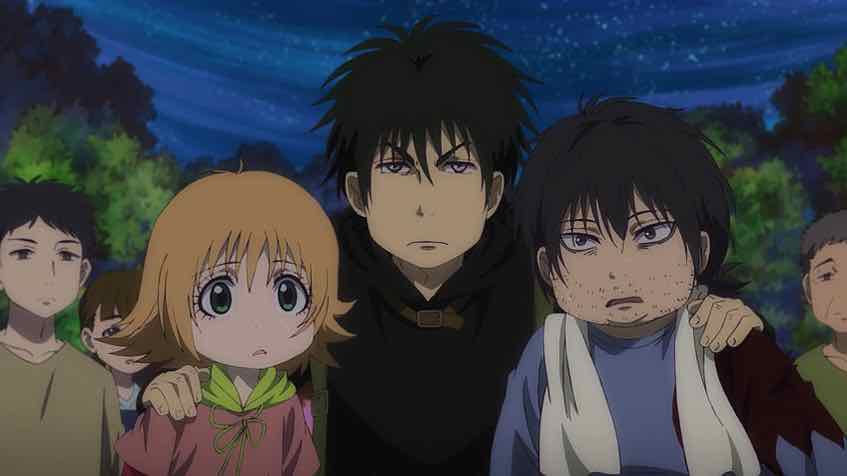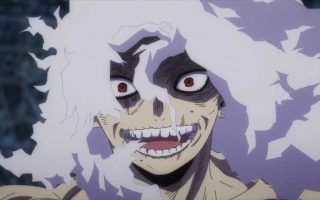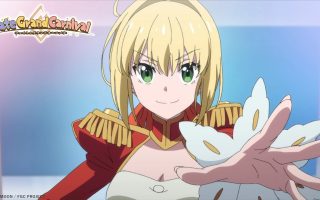As much as it agonizes me, I have to use the “End” title line this time. Why here – and not with. say, Jibaku Shounen Hanako-kun? That series has a track record of sequels. It’s a top-25 volume seller in manga form. I feel almost certain a Hanako-kun sequel will happen at some point. Dekin no Mogura is popular, make no mistake. It sells well. And the anime has been well-received where it counts, ranking as the top-rated summer series on Anikore. But the sales are not on the Hanako level, or that of Eguchi-sensei’s prior series Hoozuki no Reitetsu (which is debatably the ultra-rare seinen kaijuu). I still think more anime is a better than even money bet, but I’m not ready to say it’s anything like a lock.
It would be criminal if that didn’t happen. In the first place this episode made no overtures towards concluding anything. In fact it would up framing the entire first season as a prequel, with the main story starting now. And in the second, Dekin no Mogura is simply a great series. Anime needs as many of those as it can get – they’re rare as hen’s teeth, you know. Momoyuki is my favorite new character of the season and probably the year in anime, but he’s surrounded by an extremely winning cast.
At this point I see this show as basically a Justice League-style hero show as if it were a rakugo story. I imagine there’s a pretty stark line between those who find that prospect appealing and appalling, and which side of the line you fall on will tell you if Dekin no Mogura is for you. There’s a ton to unpack in this finale, both on Samejima and back on Drawer Street. It’s Momoyuki who Yae-chan tasks with recounting the narrative of what’s just gone down, which was obviously a wise choice as he’s as silver-tongued as they come. He tells it like it is, pretty much, and after a bit of uncertain sheep behavior the islanders turn on their masters like a pack of wild dogs.
The islanders’ behavior is not especially praiseworthy, to say the least. At first they demand instructions from Sacchan (the matriarch), unable to decide anything on their own. She’s not interested, as she’s in a state of panic over the merfolk developments and her son’s total wig-out. They do believe Mori-kun at least (whether they would have without Mogura-san is hard to say). But then they turn on the Samejima savagely, gossiping and whispering among themselves as all their pent-up resentment starts to come out. Last week it was Kyouko who went full superhero, this time it was Yaeko’s dad. He disabuses the sheeple of any notion that they’re blameless in all this, and basically takes responsibility for the island in crisis mode himself.
Yaeko-papa is one smart dude, that was already clear (as is the fact that he strikes one eerily as Magi-kun in 30 years). He doesn’t brook bullshit and he tells it like he sees it. The island will be in good hands there, and it seems Mori-kun has decided to leave it for Tokyo (Momoyuki loving to visit real estate offices and check layouts totally fits him). I think that’s a very wise decision – even with the fall of Yui and her clan from grace, there’s too much bad karma in that place for him. Yaeko’s parting gift for Yui – a box of mukade with an amusement park ticket taped to the lid – is extremely satisfying. And one senes that it was intended as a gift for Mori as much as for Yui.
Then we have the old man, Yuhachi. He becomes progressively more cogent as this arc advances, interestingly. It turns out he was a friend of Sacchan when they were young – she was sweet on him in fact, but he was a player. He asks Mogura if his ancestor was on Celebes during the war, having made the obvious connection, and whether he’s still alive. This is awkward for Mogura, obviously, and he chooses to simply say his ancestor has passed on. Yuhachi gives him a letter for his altar, a short and to-the-point one: “I can see strange things now – you did this, didn’t you? P.S. I’ve lived a long life. That was you too, wasn’t it? Thank you.”
Yuhachi may claim he’s no writer, unlike his father and great-granddaughter, but if not elegant that simple message is strangely moving. In the final analysis the Samejima come off as more pathetic than anything – just as frustrated and unhappy as anybody else. But that doesn’t undo the great harm they’ve caused, and as Yae-papa says, that’s not something that can be forgiven easily. It’s hard to know what will happen to their island now, especially if the factory goes under after all this. Such places are on a perennial knife’s edge in modern Japan. But whatever its fate is, they’ll have to meet it – going on as they were was simply intolerable.
Finally, in the aftermath of all this, we learn a bit about Mogura Momoyuki. Some of it comes from his own lips – he admits he’s been wandering the Earth (performing random acts of mercy) since the Sengoku period (at least), and one of his prior monikers was “The Priest Koetsu“, under which he was responsible for the merfolk legend in the first place (he says he forgot, and I believe him). But even more comes from Ukigumo (Umeka Shouji), the candy seller back in Drawer Street who Magi meets when bringing some sweets for Momoyuki. She tells Magi she’s Mogura’s lover, then says she was joking – she’s his “jailer”.
Momoyuki, it seems, is a fallen God. Ukigumo (“Drifting Cloud”) says he’s the Kami “Ookamuzumi-no-yumi”, which is not a name I can find any record of. But Eguchi Natsumi loves to base her characters on “real” (mythological) figures, and I stumbled on a promising lead called Ookamuzumi-no-Mikoto (he has exactly one jinja, in Tokyo), 意富加牟豆美命 or オオカムヅミ. And indeed Princess Usagi confirms that Ookamuzumi-no-Mikoto is in the Kojiki, a God renowned with the bow who picked three peaches and threw them at the thunder Gods of Hell, forcing them to retreat.
Whatever Momoyuki was and is, he’s a good and kind being. He can make even Magi feel safe with his presence after being creeped out by Drawer Street in the rain and the otherworldly Ukigumo. As we know, being here among us is a punishment. As a fallen Kami he cannot even partake in liquor as an indulgence (in cooking is allowed). But why? What has Ookamuzumi-n0-Mikoto – if that’s who he is – done to warrant this eternal exile? Perhaps it really is no more than caring too much and helping when and where he’s forbidden to, but that’s clearly a question for later in the story.
I can honestly say “my bad” for not being higher on The Earthbound Mole right from the beginning. I should have expected greatness based on Hoozuki no Reitetsu. But you know, that mistake had an upside – it made Dekin no Mogura a wonderful surprise, the great series I didn’t see coming. And on top of everything else, it’s fantastic to see Brain’s Base strike gold with a really clever and witty adaptation, one that delivers essential Eguchi even without a big budget. This is such a smart series, funny on so many levels yet also quite emotionally powerful, and never less than fascinating. I’m pulling hard for there to be more anime, because this is a show I genuinely love.
The post Dekin no Mogura (The Earthbound Mole) – 12 (End) and Series Review appeared first on Lost in Anime.




